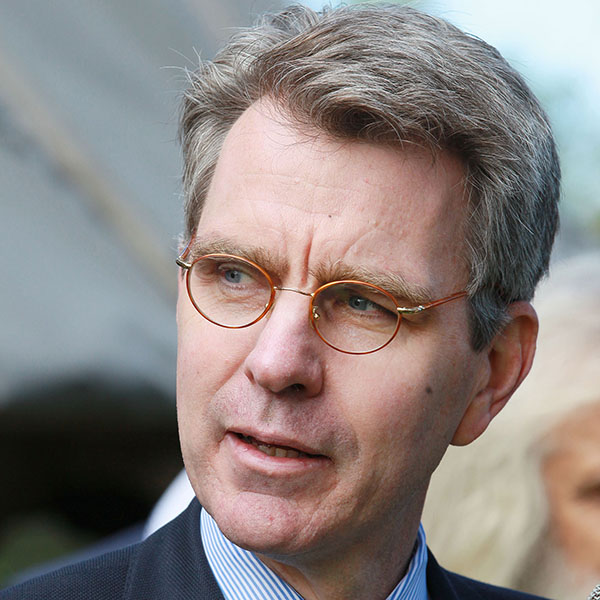| our attitude, aims & actions | infographics | breaking the mold | be boundaryless | the people | pdf version
 geoffrey pyatt '85 u.s. ambassador
geoffrey pyatt '85 u.s. ambassadorto ukraine
When Geoffrey Pyatt, ’85, arrived in Kiev in August 2013, he quickly found himself at the epicenter of one of the world’s most dangerous conflicts since the Cold War.
Ukraine’s president, Viktor Yanukovych, was ousted seven months into Pyatt’s term amidst a series of violent protests sparked by the failed leader’s refusal to sign an agreement that would have solidified closer ties with the European Union. Pro-Russian insurgents seized the opportunity created by the political and economic fallout of the revolution, and took control of the Crimea region in eastern Ukraine – a situation that remains quite tenuous.
As the 8th U.S. Ambassador to Ukraine, Pyatt served as a voice for reason and de-escalation at a critical time in the contested region. And in May, he was named the U.S. Ambassador to Greece.
Pyatt’s rise – including posts in India, Honduras, Pakistan, Hong Kong, and Vienna – make him the perfect example of what it’s like to be boundaryless in pursuit of creating positive change.
BE BOUNDARYLESS.
Anticipate the changing needs of our interconnected world and train our next generation
of leaders to solve some of society’s greatest challenges. [stay nimble]
Since our last strategic plan, we launched three new M.A. programs: philosophy, politics
and economics (PPE), modeled after Oxford’s successful program that fosters the development
of skills that cut across the disciplines; medicine, science and technology studies
(MSTS), provides an innovative science and technology program with an added emphasis
on medical anthropology; and finally, the master’s in public policy (MPP), offered
jointly with the School of Social Ecology, leverages Southern California as a policy
laboratory for the world. And a fourth master’s program, M.S. in cognitive neuroscience,
has just received approval.
We have also launched two new undergraduate majors, social policy and public service
(B.A.), and cognitive sciences (B.S.), as well as several new undergraduate certificate
or specialization programs in areas ranging from cultural competency to entrepreneurship.

We are planning to launch several new programs building on our core strengths, including linguistics/language sciences, communications, international and global analysis (M.A.), fMRI/neuroimaging methods (M.A.) and audiology (Au.D./Ph.D.). We intend to build out our programs (newly-formed since the last Strategic Plan), in cognitive neuroscience (M.A./Ph.D.), cognitive sciences (B.S.), philosophy, politics and economics (M.A.), medicine, science and technology studies (M.A.).
We play a crucial role in training a diverse student body. We do this by creating collaborative interdisciplinary programs with other units on campus, and providing transferable skills that include writing, research, and competency in statistical analysis of social data. We provide the equivalent of a liberal arts education with a considerable degree of quantitative analytical training transferrable across fields. We successfully recruit and train a diverse student body that will make up the next generation of the professoriate as well as scientists placed in non-academic careers.
For the latter, we have initiated a graduate internship/entrepreneurship program and
several departments offer professionalization workshops for non-academic careers.
We are building more connections to industry and government and we are creating two
vehicles to support this activity in addition to partnerships with the UCI’s new Office
of Applied Innovation. Addressing this challenge will also involve evaluating metrics
currently in use for graduate program evaluation to assess any disincentives they
pose against non-academic placement.

Finally, we will seek to maintain and build upon our core strengths in interdisciplinary
research and departmental and graduate work.
In addition to our eight departments, we house 22 interdisciplinary research centers
and institutes and four research facilities used by faculty across the disciplines
(the Experimental Social Sciences Lab, the Anechoic Facility, the EEG Lab, and the
California Census Regional Data Center).
Academic Analytics show remarkable strength across the board in all of our departments
and programs. Almost all are in the top quartile on AA’s measure of faculty scholarly
productivity. Faculty and students have a high success rate in winning campus awards
and honors. Success with the NSF GRFP, NAS Ford Foundation Fellowship, and other grants
has enabled us to extend guaranteed funding to all grad students through normative
time to degree.
In sum, our efforts to stay nimble include:
- Launching new degree programs to prepare students for the jobs of tomorrow.
- Bolstering core areas of excellence.
- Training graduate students for careers outside academia.
- Instilling leadership & critical communication skills in all students who pass through our doors.
| our attitude, aims & actions | infographics | breaking the mold | be boundaryless | the people | pdf version


